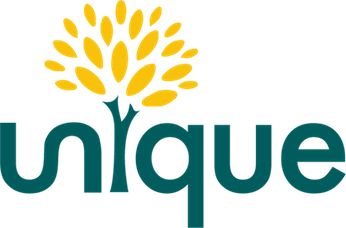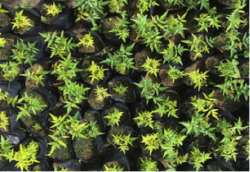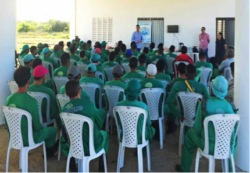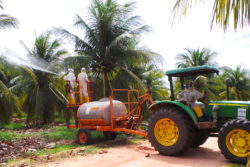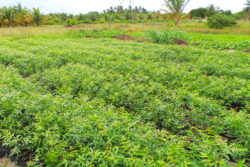. Managing Waste Responsibly
Managing Waste Responsibly
December 18th, 2018
We have been working with ECO+, a local company specialized in collection and recycling of wastes. This company has been working to collect, transport and recycle our disposals in a sustainable way, with the goal, not only to preserve the local environment and ensure a clean area for the right development of our trees, but to ensure that our waste does not become trash somewhere else. In 2018, we have recollected 14 m³ of recyclable waste, which are being processed to convert them into new materials and objects.
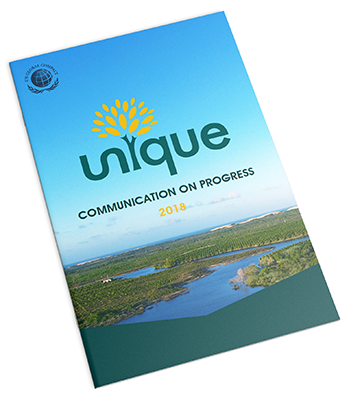 Unique Reafirms its Commitment to the UN Global Compact
Unique Reafirms its Commitment to the UN Global Compact
December 11th, 2018
As a proud member of the United Nations’ Global Compact since 2015, we have recently submitted our annual Communication on Progress Report. In this report we reaffirm our commitment to the UN Global Compact in the areas of Human Rights, Labor, Environment and Anti-Corruption, and report on our advancements in integrating the Global Compact’s 10 principles into our overall strategy and day-to-day business. We invite you to download Unique’s Communication on Progress 2018 to learn more about our efforts to create a new era of corporate and social responsibility.
.
 Tractor Obstacle Course
Tractor Obstacle Course
November 30th, 2018
Part of our commitment to the betterment of our employees is providing our workers with methods and tools that will allow them to make the best out of available resources. Our tractor drivers recently received lessons on the most efficient way to drive their tractors on our plantations, in order to ensure they conserve fuel and protect our trees and wildlife.
.
 Praia Limpia Initiative
Praia Limpia Initiative
November 22th, 2018
This month we invited our staff, their families, and kids from local schools to join our “Praia Limpia” (beach clean-up) initiative. Together we traveled to the beaches near our plantations and collected plastic and waste in order to send it to a recycling facility. At the beach the participants had the opportunity to experience plastic pollution and its impacts first-hand when one of the kids found a turtle which had died due to a piece of plastic wrapped around its body. This gave our team members the opportunity to educate employees, their families and kids in the crucial importance of reducing plastic waste. As part of our commitment to drive change in the local community, our regular plastic collection efforts contribute to relieving the weight of the tourist season on local beaches and encourage the community and tourists to keep the beaches clean.
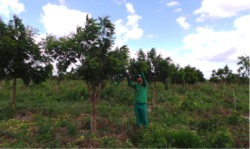 Sending Neem to EID Parry
Sending Neem to EID Parry
November 14th, 2018
Earlier this year, we had the pleasure of welcoming EID Parry, the market leader in neem-based bio-pesticides, to our plantations in Brazil. Various productive discussions were had with EID Parry, ranging from us becoming a major supplier of neem to their operations, to prospective joint venture opportunities on extraction facilities and white labelled products in Brazil. Now, we have sent samples of our neem fruits to their facilities, in order for them to study the Azadirachtin content of our fruits and evaluate their quality as we continue to discuss further partnership opportunities.
.
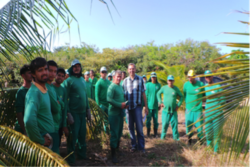 The Best and Most Prepared Employees
The Best and Most Prepared Employees
November 8th, 2018
At Unique, we invest in our people, which is why we constantly strive to provide our staff with constant training and development. The National Service for Rural Knowledge (Senar) recently visited our plantation in order to provide our employees with courses and certificates in various agricultural subjects, including machinery and safety techniques that will allow our workers to be more efficient and independent in their day to day tasks.
.
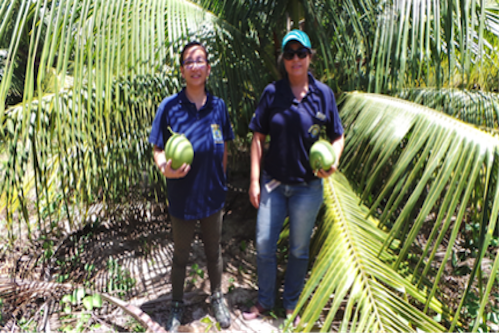 The Fruits Of Our Labor
The Fruits Of Our Labor
November 1st, 2018
This photo shows members of the Brazilian Ministry of Agriculture (MAPA) collecting a sample of our coconuts for the purpose of mapping the quality of the coconut water in the region. A small number of our dwarf coconuts have producing their first cocos verde (green coconuts), which is primarily used for coconut water, given its high sugar content and overall quality. Although we are not yet at commercial production, it is important for us to examine the quality of our coconut water at an early stage, as we are currently in the process of reviewing and evaluating different methods to ascertain the most commercially attractive options to maximize returns from the coconut plantation.
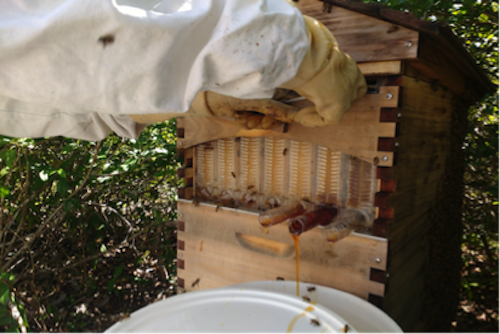 Honey For All
Honey For All
October 24th, 2018
We have finished harvesting all of our beehives and are now in between harvest seasons. No hives have been lost during the dry season, owing to our commitment to provide bees with flowers from local vegetation instead of artificial feed. We harvested 1,300 kg of honey in our first year and have joined a local association of honey producers in Trairi in order to sell our honey to the state in small bite-sized plastic packs that can be used in school meals.
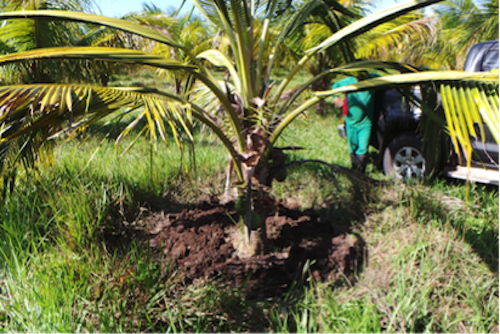 Coconuts Nurture Coconuts
Coconuts Nurture Coconuts
October 14th, 2018
During the dry season, we use shredded coconut husks and leaves to build a nest around our trees, which generates maximum humidity and provides the trees with nutrients once the husks start to naturally decompose. This method allows us to use organic, sustainable inputs to benefit our trees while also providing nutrition to for the soil.
.
Nurture the Soil that Nurtures the Tree 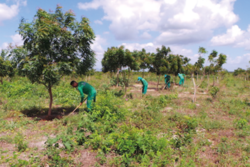
October 3rd, 2018
Through chemical analysis of the soil, our agronomists determine the pH levels, alongside the nutritional and physical composition of the soil. The soil is then assessed for natural mineral requirements, with gypsum and limestone added to reduce aluminum levels and enhance the soil’s physical qualities. Limestone helps raise pH levels, reducing aluminum content and providing calcium, while gypsum provides sulfur and conditions the soil to better root growth, which is especially important for the neem trees. This work was carried out during the rainy season and has guaranteed the health of our trees through the dry season.
.
More Water is Always Welcome 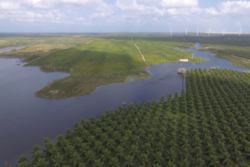
September 27th, 2018
Water is key for the successful development of our trees, which is why rain outside of the rainy season is always a welcome surprise. So far, we’ve had two good rains during the dry season to date, which have brought around 33mm of rain. This not only reduces the amount of manual irrigation needed but has also led to more flower blooms, resulting in more food for our pollinators and consequently a more conducive ecosystem around our plantations.
.
More Water = More Flowers = More Honey 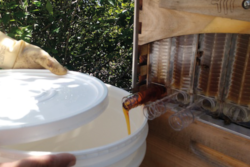
September 19th, 2018
The flower blooms that recent rains brought have led to more food for our bees and therefore an increase in honey production. So far, we have collected 800 kg of honey this season. In rural areas such as Trairi, Brazil, producers usually form a cooperative in order to gather a large amount of honey and obtain better prices than a single producer can manage.
.
Career Fulfillment Through Education 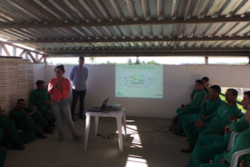
September 14th, 2018
Human resources are often an under-appreciated aspect of business, particularly in emerging markets such as Brazil. We develop competence, self-esteem and self-worth within our workforce through unparalleled staff training and individual career path plans. Our employees constantly receive information regarding safety procedures, farming methods and sustainability. This strategy not only enhances loyalty, it greatly enhances capabilities, and grants us access to the most productive workers in the local employment market.
.
Thriving in the Dry Season 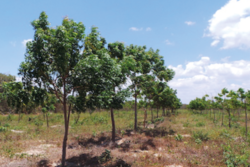
September 5th, 2018
We constantly monitor and nurture our neem trees by crowning and cutting less developed branches in order to ensure that the best performing branches are exposed to sunlight. Leaving native vegetation around the trees also allows us to provide natural foods for ants, which keeps them from targeting our trees.
.
Precision Agriculture Through Precision Technology 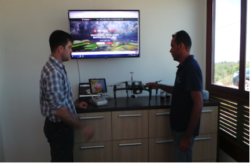
August 29th, 2018
Our experts use the latest drone technology software (Precision Mapper) to analyze real-time data. By using different views (such as the green normalized difference vegetation index, tree crown delineation and canopy cover) we are able to obtain a fast, overall analysis of the condition of the trees and the land, and determine the amount of organic inputs needed.
.
Building Facilities and Careers 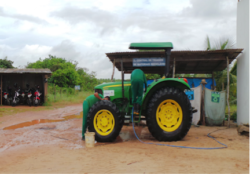
July 20th, 2018
We have built a mechanics workshop where our employees will be able to work on our tractors. Fabio Moreira de Sousa, our best tractor driver, was chosen for the position of Head of Machinery and Mechanics and sent on a 3-week long preparation course. This is part of our commitment to help our employees grow and pursue promising careers within our company.
.
Intercropping: An Ideal Match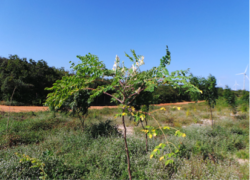
June 30th, 2018
We have planted 50 moringa trees intercropped with our neem trees as part of our trials to further enhance our project from both an economic and environmental perspective. Moringa is a hardy tree and can utilize marginal land as it is resilient to harsh growing environments and requires lower investment in comparison to other crops/trees. According to research, intercrops of moringa have led to higher yields in horticultural crops, with moringa having benefits for soil management, as well as health benefits for human consumption.
.
Innovation for Conservation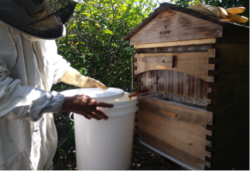
June 5th, 2018
We have purchased the latest innovation in beehives (Flow Hive Classic Auracaria 7 Frame) which allows us to quite literally obtain honey from bees on tap, with frames that consist of partly formed honeycomb cells. The bees complete the comb with their wax and then fill the cells with honey. This device is safe for bees as it contains enough space for them to move between the comb walls when honey is being tapped. This is part of our commitment towards the health of pollinators and the promotion of biodiversity in the area.
.
Sustainability Through Innovation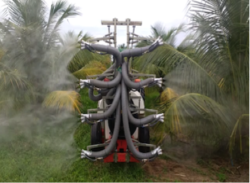
May 30th, 2018
Through the implementation of the latest advances in AgTech, we are able to increase efficiency while reducing the amount of inputs required. This image shows our new 2000 liter pesticide applicator, which allows us to save time and organic inputs by misting instead of spraying our organic pesticides. It can cover 35% more land than our previous applicator and requires two fewer workers per trip, due to the new automated misting applier.
.
Quality Requires Nurturing
May 25th, 2018
We are committed to the pursuit of sustainability, which involves finding the best methods to grow our neem trees. We constantly monitor the development of our saplings, analyzing and where necessary replanting those that are developing at a slower pace or do not show the required level of resilience. Through this activity, we ensure that all of our neem trees are of the highest genetic quality and get the optimal crop care necessary to achieve maximum productivity once they reach full maturity.
.
Fazenda Pack: A Development Tool for Our Agri Team
May 21st, 2018
With the experience we have gained over the last few years in managing large-scale agricultural projects, we ?have now created ?the ‘Fazenda Pack’, a training manual for all agricultural employees. As an informative training and development tool, this comprehensive document introduces and educates principle of sustainable agriculture across our team in Brazil, including crop-specific management practices for both neem and coconut trees. Above the norm of training offered in Brazil, this tool reaffirms our commitment in transmitting our philosophy across all stakeholders involved in our projects. The Fazenda Pack is part of our mission to ensure a healthy, safe and positive work environment?for all our employees aligned with our commitment as part of the UN Global Compact. This is also an integral part of making sure that we transmit our philosophy to our workers, to ensure that they know that what they’re doing goes beyond labor, we want them to know that they are an integral part of our future and we want them to share our vision with the local community.
.
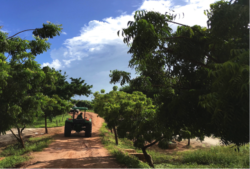 Marvelous Roots
Marvelous Roots
May 1st, 2018
The neem tree is a marvelous living organism, which never seizes to amaze. Its roots? can extend up to 20 meters through the soil, and?can reach?up to? twice the height of the tree, allowing it to obtain moisture and nutrients from?far below the?surface, and without having to compete with other vegetation. This gives?the neem tree ?the ability ?to ?flourish? in ?hot and humid climates, like those in North East Brazil.
.
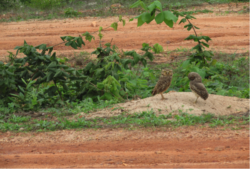 Protecting Wildlife
Protecting Wildlife
April 25th, 2018
This picture, taken at our plantation in Northeast Brazil, shows a family of burrowing owls, named because they live underground in burrows that have been dug out by small mammals. Unlike other owl species, these owls are active during the day and spend most of their time on the ground, where they also breed. These owls are yet another example of how our sustainable practices and organic inputs not only benefit our crops, but rather all living creatures. Allowing local vegetation to grow and using natural agricultural inputs ensure that local wildlife has access to a safe and regenerative environment. Burrowing owls are endangered throughout North and South America, in part due to the use of chemicals and synthetics in agriculture, which have a run-off effect on the wider environment. By only using natural inputs like neem-based solutions, our projects remain sustainable for the environment, animals and society.
.
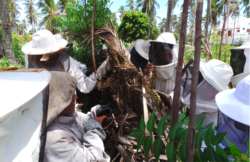 Testing Our Honey
Testing Our Honey
April 12th, 2018
At? Unique, we ?are committed to using ?100 % ?sustainable and natural ?inputs to grow our neem and coconut trees. We recently? partnered with? the Federal Institute of ?Ceara ?in order to conduct a study assessing the traceability of Azadirachtin, a neem-derived natural pesticide, in our honey. The honey proved to be free of any residue from the active ingredient in neem, reinforcing neem’s beneficial role to vital pollinators in our ecosystem.
.
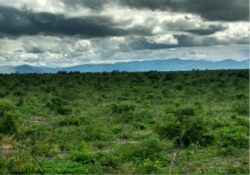 Working in Harmony? with Nature
Working in Harmony? with Nature
April 10th, 2018
At ?Unique we believe in business models that ?protect ?the environment and surrounding ecosystems. ?Instead of clearing the entire plantation from native plants, we use every fifth? row as an? area ?for small local vegetation to grow. This technique has had ?a positive effect on our bees, which were able to survive the dry season without additional artificial feed.? Our? bees are not only productive, but living proof that profit? and sustainability can coexist and ?thrive ?together.
.
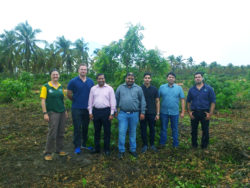 Parry’s Bio Visit Our Project
Parry’s Bio Visit Our Project
March 21st, 2018
Parry’s Bio, the market leader in Azadarachtin-based bio-pesticides, sent its EID team to inspect and review our neem plantations in Brazil. During their visit, in which our C.C.O. Andrew Goodman, proudly toured Parry’s US-based President, Mr. Rao and his Brazil Executives, around the largest neem plantation in the world, our lead agronomist, Henrique Dos Santos Lopes, demonstrated the different precision techniques we use to apply neem-based pesticides in order to maximize yields while ensuring environmental protection. The Parry’s Bio visit went extremely well and we are working towards the possibility of a synergistic partnership between our two companies…keep an eye out for updates on this.
.
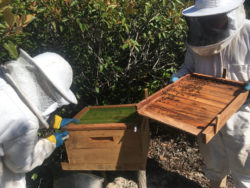 Productive, Happy and Thriving Bees
Productive, Happy and Thriving Bees
March 13th, 2018
With the rainy season underway, flowering has begun. This is great news for our apiaries, which are now deemed productive and expected to produce up to 40kg of honey and 1kg of propolis (a wax with antibiotic properties) per hive, per year. By pollinating, our bee populations ensure that the surrounding ecosystems remain diverse and sustainable, while strengthening the yield potential of our crops.
.
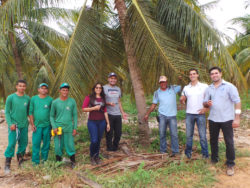 New collaborations and modern techniques
New collaborations and modern techniques
March 5th, 2018
We are constantly trying out different techniques and collaborating with other companies and universities in order to test optimal plantation management methods for our project. This photo shows our lead agronomist, Henrique Dos Santos, with our employees Marciano, Robson, Clemido and Rogeiro, alongside students from the Federal University of Ceara. The students assisted our members with a technique known as Endotherapy. Endotherapy allows for the direct application of chemicals, including the Bio-chemicals that we use, without waste and contamination, while traditional spraying techniques can result in negative effects for human health and the environment. By injecting a precise amount of the substance directly into the sap of the tree, endotherapy ensures an even distribution and immediate uptake of vital nutrients.
Inputs for Successful Organic Farming
February 14th, 2018
We ensure the protection and prosperity of our trees through the ?yearly ?application of over 100 tons of organic inputs ?(fertilizers, soil conditioners, and plant protection products) such as limestone, organic manure, water gel and neem cake to strengthen ?our neem trees and coconut palms.
.
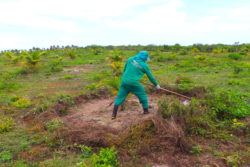 Avoiding Tillage to Preserve the Soil
Avoiding Tillage to Preserve the Soil
February 5th, 2018
Tilling promotes erosion and destroys root systems of native ?plants and shrubs. To avoid harming our crops and the natural environment, we clear a circle around the trees to avoid competition and ensure proper nutrition for the tree. Between the lines ?we cut overgrown plants 3 cm above ?the ground ?to encourage biodiversity and reduce monoculture.
.
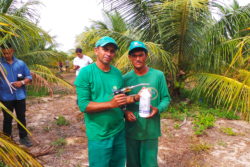 Azadirachtin Inputs to Secure Our Projects
Azadirachtin Inputs to Secure Our Projects
January 31st, 2018
Our agronomists train our team leaders and farm workers to guarantee the thriving of our crops. ??To achieve this goal, we apply inputs containing Azadirachtin extracts like AzaMax. With this botanical insecticide, miticide, and nematocide we are securing the future of our agricultural projects.
.
 Coconuts and UAV Technology
Coconuts and UAV Technology
January 31st, 2018
This aerial coconut shot, taken with our DJI Matrice 100 drone over Fazenda Lagoa Grande, is the result of our implementation of UAV technology. This technology allows us to collect and analyze individual crop data across our plantations. Our drones show the precise development of our crops, revealing production inefficiencies and enabling better crop management.
.
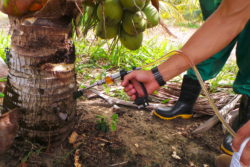 Natural Crop Care Solutions
Natural Crop Care Solutions
January 17th, 2018
When applying natural crop care solutions, we carefully examine our trees and the soil to estimate the necessary amount ?of pesticides and fertilizers needed and to create efficient correction strategies ?for different areas of the plantation.?To reduce the use of pesticides and fertilizers, we utilize precision agriculture?prior to application to define the exact amount of nutritional inputs needed.
.
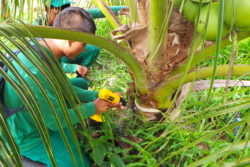 Specialized Teams to Detect Pests
Specialized Teams to Detect Pests
January 9th, 2018
We ?have specialized teams dedicated to ?detecting pest populations while ?still in their early stages. ?These teams are trained to ?supervise and ?care for our trees. ?Our care ?strategies significantly reduce our ?need to apply natural and organic solutions.
.
Nursing the Future
January 2nd, 2018
Our nursery in Brazil is dedicated to responsibly growing elite seeds with high quality standards. Our seedlings and small trees will be planted soon, as the upcoming rainy season will allow our projects to bloom.
.
.
See 2017’s Plantation Development See 2016’s Plantation Development
